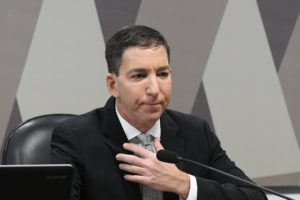Truthdigger of the Week: NSA Whistle-Blower Edward Snowden (Updated)
The Guardian notes, "Snowden will go down in history as one of America's most consequential whistleblowers, alongside Daniel Ellsberg and Bradley Manning."
Every week the Truthdig editorial staff selects a Truthdigger of the Week, a group or person worthy of recognition for speaking truth to power, breaking the story or blowing the whistle. It is not a lifetime achievement award. Rather, we’re looking for newsmakers whose actions in a given week are worth celebrating. Nominate our next Truthdigger here.UPDATE
: The Guardian on Sunday revealed (at his request) that Edward Snowden, a 29-year-old former technical assistant for the CIA, is the source of the leak behind its recent stories on the National Security Agency’s surveillance of phone records and Internet activities. This story has been updated to reflect the new information.
Four major Internet, technology and privacy stories hit the Web this week.
On Wednesday, Americans learned that the National Security Agency has been collecting the telephone records of millions of U.S. customers of the telecommunication giant Verizon.
On Thursday it was revealed that the NSA claims internally that it has been using a top-secret spying program called PRISM to gain direct access to personal data belonging to customers of top Internet companies, including Google, Facebook, Microsoft, Apple and Yahoo. Many of those companies denied having this relationship with the NSA, but acknowledged, according to The New York Times, that they cooperated “at least a bit.”
On Friday we were told that President Obama has ordered his top national security and intelligence officers to construct an apparatus for global cyberattacks, which includes a list of targets overseas and potentially within the country.
On Saturday it was disclosed that the NSA has a sophisticated tool for recording and analyzing the sources of its collected intelligence, a fact that gives the lie to the agency’s repeated assertions that it cannot keep track of all of the surveillance it performs on Americans’ communications.
Those revelations came to us courtesy of 29-year-old Edward Snowden, a former CIA employee who currently works for NSA outside defense contractor Booz Allen Hamilton. And as The Guardian noted, “Snowden will go down in history as one of America’s most consequential whistleblowers, alongside Daniel Ellsberg and Bradley Manning.”
Before the disclosure of Snowden as the source, Glenn Greenwald, The Guardian columnist and lawyer who published the stories containing the leaked information along with reporters at The Washington Post, reported that the then-anonymous individual is a career intelligence officer who is deeply disturbed by the Obama administration’s invasion of the privacy of U.S. citizens. Greenwald, who since the mid-2000s has written about the government’s assault on American civil liberties in the post-9/11 era. Snowden is a reader of Greenwald’s work.
The courage required to divulge state secrets is remarkable. We live in an age of unprecedented attacks on those who blow the whistle on what they believe to be wrongdoing in government and business. The disclosures came during the same week that the U.S. government began a trial against perhaps the nation’s most famous whistle-blower, Pfc. Bradley Manning. Manning will likely face life in prison or worse for sending classified documents to the whistle-blowing website WikiLeaks.
Snowden acknowledged he was aware of the consequences he would face once his identity became known. “I understand that I will be made to suffer for my actions,” he wrote in a note that accompanied the first set of documents he sent to the British newspaper. But, he added, “I will be satisfied if the federation of secret law, unequal pardon and irresistible executive powers that rule the world that I love are revealed even for an instant.”
According to The Guardian, Snowden “has had ‘a very comfortable life’ that included a salary of roughly $200,000, a girlfriend with whom he shared a home in Hawaii, a stable career, and a family he loves. Yet Snowden says he is “willing to sacrifice all of that because I can’t in good conscience allow the US government to destroy privacy, internet freedom and basic liberties for people around the world with this massive surveillance machine they’re secretly building.”
Snowden says he didn’t want the disclosure of his name to detract from the story. “I really want the focus to be on these documents and the debate which I hope this will trigger among citizens around the globe about what kind of world we want to live in.” He also wrote that his “sole motive is to inform the public as to that which is done in their name and that which is done against them.”
The existence of a massive eavesdropping apparatus renders moot the previous legal requirements of intelligence agents to acquire individual warrants to conduct surveillance in accord with the Foreign Intelligence Surveillance Act of 2012, which recognized as illegal the monitoring of any U.S. citizen or person located within the United States. The spying programs constitute “an incredibly invasive system of surveillance worldwide that has zero checks of any kind,” Greenwald said Friday on “Democracy Now!”
President Obama was unimpressed with public concern over the revelations. In his first public response to the disclosures, he said Friday that the public should leave concerns over the potential dangers of spying to the nation’s political leadership.
“These are the folks you all vote for as your representatives in Congress and they are being fully briefed on these programs,” he said. He also insisted that any surveillance was “very narrowly circumscribed.”
Knowledge of programs like those revealed this week go at least as far back as 2006. In May of that year, journalists reported that the telecommunication company AT&T had built “secret rooms” in cities across the country in which the NSA could “look at every individual message on the Internet and analyze exactly what people are doing.” What’s new is details about the shape that those programs have taken in the years since, as well as unambiguous confirmation that they are ongoing and expanding.
Privacy is deadly business. Psychologists tell us it is necessary for the development of personal independence. Artists, philosophers and scientists recognize its essential role in the birth of new ideas. And those who have gotten captured or killed for their political commitments worldwide, ever since someone stood outside of a tent and listened in on the conversation inside, know it is an essential condition for political freedom. Freedom is a value Americans love to claim they love.
Greenwald and Snowden have provided the greatest opportunity in a decade to publicly and in mass oppose the infiltration by government and corporations into Americans’ private lives. For giving us that opportunity, we honor the courageous Edward Snowden as our Truthdigger of the Week.
‘Democracy Now!’:
Tracy Bloom contributed to this report.
Your support matters…Independent journalism is under threat and overshadowed by heavily funded mainstream media.
You can help level the playing field. Become a member.
Your tax-deductible contribution keeps us digging beneath the headlines to give you thought-provoking, investigative reporting and analysis that unearths what's really happening- without compromise.
Give today to support our courageous, independent journalists.





You need to be a supporter to comment.
There are currently no responses to this article.
Be the first to respond.